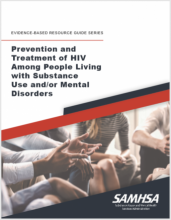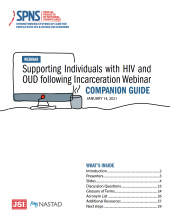
Substance Abuse and Mental Health Services Administration (SAMHSA)



Substance Abuse and Mental Health Services Administration (SAMHSA)
This month, the Department of Health and Human Services (HHS), through the Substance Abuse and Mental Health Services Administration (SAMHSA), announced three funding opportunities to strengthen mental health and substance use systems and services for people with or affected by HIV:
Clinicians can now access up-to-date evidence-based office-based addiction treatment recommendations for treating opioid use disorder (OUD) on a smartphone app.
This policy brief identified states potentially at risk for an HIV or HCV outbreak and used data from multiple sources to examine rural-urban differences in 1) state-level infectious disease surveillance, prevention activities, and collaboration with stakeholders; 2) local health department-level
This Advisory offers guidance to providers and administrators in SUD treatment programs on screening clients for hepatitis A, hepatitis B, and hepatitis C infections, as well as action steps for the treatment and support of clients with a viral hepatitis infection and a SUD.
This Advisory highlights strategies and considerations for substance use disorder (SUD) treatment providers to integrate HIV services into their practice and effectively engage people with HIV in SUD treatment.
This publication, part of SAMHSA's Evidence Based Resource Guide series, addresses the co-occurrence of HIV and mental illness and/or SUD.
To address the infectious disease consequences of the opioid crisis in the U.S., a public workshop titled Integrating Infectious Disease Considerations with Response to the Opioid Epidemic was convened on March 12 and 13, 2018, by the National Academies of Sciences, Engineering, and Medicine.
This ready-to-use training package is designed to provide HIV clinicians (including physicians, dentists, nurses, therapists and social workers, and counselors, specialists, and case managers) with an overview of the challenges and strategies for change in working with individuals living with HIV